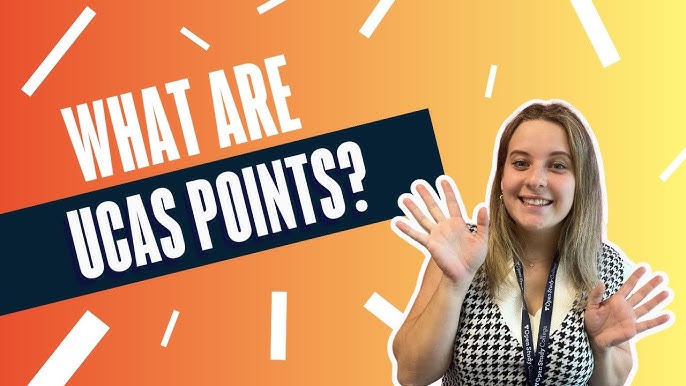If you’re considering pursuing higher education in the United Kingdom, you’ve likely encountered the acronym UCAS.
But what does UCAS stand for, and how does it impact your journey to university?
In this post, I’ll go into UCAS, its workings, and provide you with valuable tips to navigate this essential application process.

Unraveling UCAS
UCAS stands for Universities and Colleges Admissions Service. It’s a non-profit organization dedicated to assisting UK students in their quest to apply to undergraduate and postgraduate courses at universities and colleges across the country.
More than just an application portal, UCAS also serves as an invaluable source of information and guidance for students, parents, school and college advisers, and higher education professionals.
The UCAS Application Process
How Does UCAS Work?
UCAS is the primary gateway for applying to universities in the UK. To begin the application process, students must submit their applications through the UCAS platform. Here’s how it works:
- Choose Your Courses: Students can select up to five courses, but remember, they can only submit one application at a time.
- Application Submission: Once the application is complete, it is sent to the universities to which the student has applied.
- University Review: The universities meticulously review the applications and decide whether to extend offers to the applicants.
When to Apply to UCAS
Timing is crucial when applying to UCAS. The deadline for undergraduate course applications is January 15th for UK students and October 15th for international students.
Postgraduate course applications must be submitted by January 31st. Keep in mind that some universities and colleges may have earlier deadlines, so thorough research is essential.
The UCAS Application Form
The UCAS application form is available online, making it accessible to students from all corners of the UK.
When filling out the form, students are required to provide the following information:
- Personal Details
- Educational Qualifications
- Work Experience
However, the personal statement is the standout element of the application. This section gives students a platform to explain why they are interested in the course and what they can bring to the university community.
After You Apply
Confirmation of Application
After submitting your application, UCAS will promptly acknowledge receipt via email. You will then wait for the universities to review your application and make their decisions. Updates on the status of your applications can be tracked through your UCAS account.
Top Tips for a Successful UCAS Application
Navigating the UCAS application process can be smoother with these top tips:
- Plan Ahead: Start your application process early to ensure you meet all deadlines.
- Research Thoroughly: Explore the courses and universities you’re interested in to make well-informed choices.
- Craft an Outstanding Personal Statement: Your personal statement should effectively showcase your skills and experiences and explain why you are an ideal candidate for the chosen course.
- Secure References Early: Ensure your references are submitted in a timely manner.
- Proofread Your Application: Carefully review your application to avoid errors and inconsistencies.
Additional Resources
In your journey through UCAS, don’t hesitate to tap into these valuable resources:
- The UCAS website offers a treasure trove of information and advice for students and parents.
- The National Careers Service can provide guidance for career planning and university applications.
- For information on student finance and how to apply for it, the Student Loans Company is an invaluable resource.
In conclusion, UCAS is your passport to higher education in the UK.
By understanding how it works and following these expert tips, you can enhance your chances of securing a place at your desired university.
Is UCAS only for UK students?
When it comes to pursuing higher education in the United Kingdom, many people believe that UCAS, short for the Universities and Colleges Admissions Service, is exclusively for British students.
However, this is far from the truth. UCAS welcomes international students with open arms, providing them with a streamlined application process and access to some of the world’s finest educational institutions.
In this section, I’ll explore how UCAS caters to international students and the essential steps they need to follow to embark on their academic journey in the UK.
UCAS and International Students
Over 430,000 international students hailing from more than 180 countries choose the UK as their preferred destination for higher education each year.
The United Kingdom offers a diverse range of academic programs, a rich cultural experience, and the opportunity to learn in a global environment. UCAS plays a pivotal role in making this a reality for countless international scholars.
The Path to Studying in the UK
As an international student, you might wonder how you can apply to UCAS and secure your spot at a British university. The process is straightforward, but it’s essential to be well-prepared.
Let’s delve into the key steps:
1. Meeting Entry Requirements
Before applying to UCAS, it’s crucial to ensure that you meet the entry requirements for the courses you wish to pursue. Each program may have specific prerequisites, such as prior academic qualifications or standardized test scores. Research your chosen courses and universities thoroughly to understand their specific requirements.
2. Demonstrating English Language Proficiency
Given that the primary language of instruction in the UK is English, international students need to prove their English language proficiency.
This is typically done through standardized tests like IELTS or TOEFL. Your proficiency in English is a crucial aspect of your application, as it ensures you can successfully navigate the academic environment and effectively communicate with instructors and fellow students.
3. Paying the Application Fee
To submit your application through UCAS, you’ll be required to pay an application fee. This fee covers the administrative costs of processing your application and ensuring that you’re provided with the necessary support throughout the admissions process. Be sure to have the funds ready to make this payment.
4. Location Matters Not
One of the standout features of UCAS is that you can apply from anywhere in the world. The application process is uniform for both UK and international students, ensuring that everyone has an equal opportunity to access world-class education. You won’t need to travel to the UK in advance to submit your application or complete any administrative tasks.
Tips for International Applicants
If you’re an international student aspiring to study in the UK via UCAS, here are some valuable tips to help you navigate the process smoothly:
1. Start Early
The application deadline for international students is October 15th. It’s essential to start your application early to avoid last-minute rush and stress. The early start gives you ample time to gather required documents and address any unforeseen issues that may arise.
2. Gather Required Documentation
Ensure you have all the necessary documents ready for your application. This includes your passport, academic transcripts, and English language proficiency test results. Having these documents readily available will expedite the application process and prevent unnecessary delays.
3. Budget for Application Fees
Prepare your budget to accommodate the application fee. It’s an essential part of the process, and having the funds ready when you need to pay it will ensure your application remains on track.
4. Stay Informed
Regularly check your UCAS account for updates on the status of your applications. This will help you stay informed about any changes, requests for additional information, or admission decisions. Staying in the loop will give you peace of mind throughout the process.
Who can apply for UCAS?
Are you considering pursuing a full-time undergraduate or postgraduate degree in the United Kingdom? If so, you’ve likely heard of UCAS (Universities and Colleges Admissions Service), the central hub for higher education applications in the UK.
In this section, I’ll go into the intricacies of applying through UCAS, covering everything from eligibility criteria to essential tips for a successful application.
Who Applies Through UCAS?
UCAS is the go-to platform for a wide range of students. Whether you’re a UK native, an international applicant, an EU student, or fall into one of several unique categories, UCAS is the common thread that unites your application process.
Let’s take a closer look at the various groups that rely on UCAS for their educational pursuits:
1. UK Students
As a resident of the United Kingdom, applying through UCAS is the standard procedure for pursuing higher education. Whether you’re fresh out of school or returning to education later in life, UCAS is your starting point.
2. International Students
UCAS welcomes students from around the globe. If you’re an international applicant aspiring to study in the UK, UCAS is your gateway to a world-class education.
3. EU Students
While the UK’s relationship with the European Union has evolved, UCAS remains a vital tool for EU students seeking admission to UK universities and colleges.
4. Mature Students (Over 21)
Age is not a barrier when it comes to education. Mature students aged 21 and above can take advantage of UCAS to explore new academic horizons.
5. Students with Disabilities
UCAS caters to the needs of students with disabilities, ensuring a fair and accessible application process.
6. Students from a Care Leaver Background
Students who have experienced care can trust UCAS to help them navigate the application journey.
7. Students with Estranged Parents
For students who are estranged from their parents, UCAS provides a support system to guide them toward their educational goals.
8. Students from a UK Armed Forces Background
Service personnel and veterans can utilize UCAS to transition into civilian life through higher education.
9. Students Who Have Been Bereaved as a Child
If you’ve faced childhood bereavement, UCAS is here to support your educational aspirations.
10. Students with Imprisoned Parents
Even in challenging circumstances, UCAS is a beacon of hope for students with incarcerated parents.
Exceptions to the Rule
While UCAS is the primary route to higher education in the UK, there are exceptions. For instance, those applying to the Open University or pursuing creative arts courses like art, design, or music may not be required to use UCAS for their applications.
It’s always a good idea to verify the application process with the institutions you’re interested in to ensure you’re on the right track.
Top Tips for a Successful UCAS Application
Embarking on your UCAS application journey? Here are some valuable tips to keep in mind:
1. Meet Entry Requirements
Before applying, carefully review the entry requirements for your chosen courses. Ensure you meet the necessary qualifications and prerequisites.
2. Start Early
Procrastination is not your friend in this process. Begin your application early to allow ample time for completion and obtaining references.
3. Proofread Thoroughly
Meticulous proofreading can make the difference between a successful application and a missed opportunity. Check for spelling and grammatical errors to present your best self to admissions officers.
4. Stay Informed
Frequently check your UCAS account for updates on the status of your applications. Timely responses and actions can enhance your chances of success.
What does it mean to apply to UCAS?
If you’re considering pursuing a full-time undergraduate or postgraduate degree at a university or college in the United Kingdom, UCAS, short for the Universities and Colleges Admissions Service, is your primary avenue for making this dream a reality.
UCAS is the central hub for processing applications on behalf of more than 380 prestigious institutions across the UK.
In this section, I’ll take you through the key steps to successfully apply through UCAS and secure your spot in the British education system.
The UCAS Application Process
Step 1: Create Your UCAS Account
Your journey begins with creating an account on the UCAS website. This account will serve as your gateway to the world of higher education in the UK. It’s where you’ll manage your applications, receive updates, and track your progress. Ensure that you provide accurate and up-to-date information during this step.
Step 2: Complete the UCAS Application Form
Once you’ve set up your UCAS account, you’ll move on to the application form. This is where you’ll provide essential information about yourself. The application form typically includes sections for your personal details, educational qualifications, and any relevant work experience. It’s vital to be thorough and accurate in this section, as universities and colleges will use this information to assess your suitability for their programs.
Step 3: Craft Your Personal Statement
One of the most critical aspects of your UCAS application is the personal statement. This is your opportunity to shine and demonstrate why you’re the perfect candidate for the course you’re applying to. Your personal statement should be a well-crafted essay that explains your motivations, aspirations, and what you can bring to the university community. It’s your chance to stand out from the crowd, so take the time to write it thoughtfully.
Step 4: Pay the Application Fee
To complete your UCAS application, you’ll need to pay an application fee. This fee covers the administrative costs associated with processing your application and providing you with the necessary support throughout the admissions process. Be sure to have the funds ready to make this payment without any delays.
Step 5: Submit Your Application
Once you’ve filled out the application form, perfected your personal statement, and paid the application fee, it’s time to submit your application. UCAS will then forward your application to the universities and colleges you’ve applied to.
Step 6: Stay Informed
After submitting your application, you’ll want to keep a close eye on your UCAS account. This is where you’ll receive updates on the status of your applications. Universities and colleges will review your submissions and make decisions about whether to offer you a place. Regularly checking your UCAS account will keep you informed about any changes, requests for additional information, or admission decisions.
Important Considerations
Applying to UCAS is a competitive process, with numerous applicants vying for limited spots in prestigious institutions. To maximize your chances of success, consider the following:
- Start Early: The application process for UCAS can be time-consuming. Beginning early allows you to avoid last-minute rush and stress.
- Know Your Deadlines: Deadlines for submitting applications can vary depending on the course and the university or college. Make sure you’re aware of the specific deadlines for your chosen programs.
How much does UCAS cost?
For those aspiring to join the ranks of students pursuing higher education in the United Kingdom in 2023, understanding the financial aspects of your UCAS application is crucial.
The application fee plays a significant role in this process, and it’s essential to be aware of the costs involved.
UCAS Application Fee Structure
The UCAS application fee structure for 2023 entry is as follows:
Single Choice Application
If you’re applying to a single university or college for your desired course, the application fee is £22.50. This is a one-time payment that covers the processing of your application and the services provided by UCAS throughout the admissions process.
Multiple Choices Application
For those who wish to cast a broader net and apply to multiple universities or colleges, the application fee is slightly higher. Applying to multiple choices, i.e., more than one institution or program, will incur a fee of £27. This fee accounts for the additional administrative work associated with processing multiple applications.
Important Considerations
Here are a few important considerations regarding UCAS application fees:
- Payment Method: UCAS accepts various payment methods, including credit or debit cards. Ensure you have a valid payment method ready when you’re ready to submit your application.
- Additional Costs: While the application fee is a significant upfront cost, it’s essential to budget for other potential expenses, such as standardized test fees, visa applications, and living expenses in the UK.
- Plan Accordingly: Since applying to multiple choices incurs a slightly higher fee, it’s wise to carefully consider your options and choose the universities and courses that align most closely with your academic and career goals.
- Early Application: Starting your application early not only allows you to prepare your materials thoroughly but also gives you ample time to budget for the application fee and any associated costs.
Conclusion
UCAS is the pivotal bridge that connects diverse students to their higher education dreams in the United Kingdom.
Whether you’re a UK resident, an international applicant, or fall into a unique category, UCAS ensures that your educational journey is seamless.
By following the application tips provided, you’ll be well on your way to unlocking the doors of opportunity and embarking on a fulfilling academic adventure.
Remember, UCAS is here to guide you, and your dreams are within reach.
So, take that first step, and let UCAS be your partner in achieving your academic aspirations. Your journey begins now.
ALSO SEE:
International student life in the UK, USA, CANADA
How To Cut Costs While Studying In The UK
Cheapest University in UK for Africans
Top 25 Industries For Nigerian Students Seeking Employment In The UK
UK Student Work Study – Tips for Working While Studying

Hello, I’m Emeka by name, an article writer with a passion for words and storytelling. I have a knack for crafting engaging and informative content that captivates readers and delivers valuable insights. Whether it’s exploring the latest trends, sharing knowledge, or diving into creative narratives, I’m here to bring words to life. Join me on a journey through the world of ideas and stories as we explore the power of written expression.





